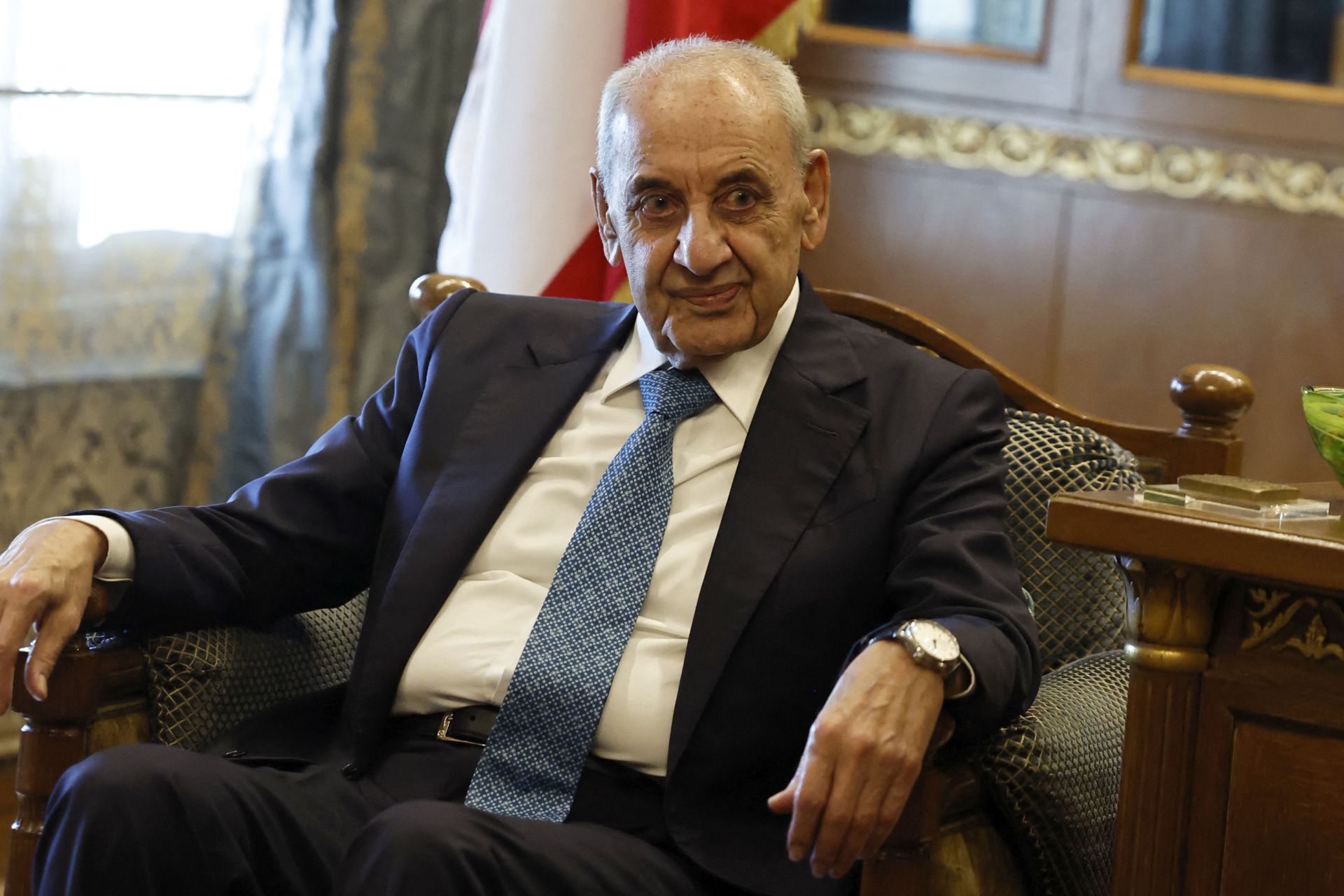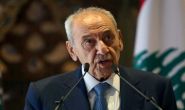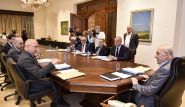
For Parliament Speaker Nabih Berri, UN Security Council Resolution 1559 seems to be a thing of the past. This is what the head of the legislature stated in an interview on Thursday night with the local TV channel Al-Jadeed, saying that 1559 is “behind us,” and that “the only international resolution” on the agenda is “1701.”
This statement has sparked numerous reactions in political circles, leading to various questions. What are the underlying stakes of Berri's statement? Is he seeking to definitively turn the page on Resolution 1559? Is he genuinely planning to implement 1701?
Since its adoption, Resolution 1559 has been a major point of contention in Lebanon, particularly on the issue of Hezbollah's disarmament. For the allies of the pro-Iranian group, including the Amal movement led by Berri, this resolution is viewed as international interference aimed at weakening a key actor in the resistance against Israel. Moreover, Hezbollah's supporters argue that the armed organization remains necessary to defend Lebanon against threats from Israel.
“For the Speaker of the House, insisting on Resolution 1559 today no longer has practical meaning, since one of the main goals of this resolution (the Syrian withdrawal) has been achieved,” notes a political analyst who requested anonymity. However, “the issue of Hezbollah's disarmament remains not only unresolved but has also lost its centrality in international discussions, especially after the 2006 war and the adoption of Resolution 1701,” the analyst continues. By making such statements, Berri is seeking, according to the analyst, to “shift focus away from this explosive issue to maintain Lebanon's relative stability and avoid reopening a debate that could further polarize the country.” In other words, he is initially trying to “reassure Hezbollah by avoiding confrontation on this issue, in order to gain gradual concessions from them regarding the implementation of 1701,” the analyst explains.
As an ally of Hezbollah, and if one follows this logic, Berri is therefore in a delicate position, attempting to strike a balance between international pressure and Lebanon's internal dynamics. “If he wants to ease international tensions and avoid direct confrontations with Israel, he must send positive signals regarding the implementation of Resolution 1701,” says the analyst. Does his speech, then, reflect a desire to shift the debate toward more pragmatic and immediate issues, such as managing tensions with Israel within the framework of 1701? Would Hezbollah, whose position and capabilities have significantly strengthened since 2006, be willing to make concessions on its military role under a strict application of the resolution?
While Berri has recently made his position clear in favor of a ceasefire and the implementation of 1701 (which explicitly references 1559), opposition forces caution against taking this at face value.
On October 1, Berri revealed his support for a ceasefire and the implementation of 1701 after meeting with caretaker Prime Minister Najib Mikati in Ain el-Tineh. A similar scenario unfolded two days later, following a meeting that brought together the heads of the legislative and executive branches with the former leader of the Progressive Socialist Party (PSP), Walid Joumblatt. However, according to opposition forces, when Berri speaks of implementing 1701, he means “a return to the situation that existed before October 7 (the date of Hamas' offensive against Israel, ed.),” that is, a partial implementation of the resolution without a total disarmament of Hezbollah.
“Berri wants to send a message by declaring that 1559 is ‘behind us:’ that the implementation of 1701 will not be possible either,” says Charles Jabbour, head of communications of the Lebanese Forces (LF). “However, this is an international resolution, and it is not up to the Speaker of the House to decide its fate, especially when we know that if 1701 had been respected, we would not be where we are today,” he insists. “This is why we will reiterate tomorrow, from Meerab, where we are set to meet with opposition MPs, our commitment to Resolutions 1559 and 1701, and to electing a President of the Republic who can ensure the full implementation of these texts,” he adds.
Resolution 1559, adopted in 2004, called for the withdrawal of Syrian troops from Lebanon, the dismantling of all militias, including Hezbollah, and the organization of free elections. While the Syrian withdrawal was achieved in 2005, Hezbollah’s disarmament was never implemented.
Resolution 1701 was adopted in 2006 to end the 33-day war between Hezbollah and Israel. It aimed to regulate the cessation of hostilities between the parties involved in the conflict, to ensure the presence of the Lebanese army in southern Lebanon, and to facilitate the expanded deployment of the United Nations Interim Force in Lebanon (UNIFIL) in the region, as well as to impose an arms embargo on Lebanon. However, 1701 has also never been fully implemented, although it has helped maintain a certain degree of apparent stability for 18 years.
The Weaknesses of 1559 and 1701
While Berri continues to call for the implementation of 1701, Kesrwan MP and Kataeb Party Vice-President Salim el-Sayegh believes that 1701, in its current form, “is no longer sufficient and does not match the current reality.” According to him, UNIFIL has failed in its mission, as it has not managed to prevent Israeli aircraft from flying over Lebanese territory nor to stop the rebuilding of Hezbollah's military infrastructure in the south of the country. “We suddenly discover that there is an extensive underground network built under the pretext of defending Lebanon and preventing an Israeli attack. This is tangible proof that UNIFIL was only observing what was happening without taking action,” says Sayegh.
“This is why we are calling today for an enhanced resolution, especially since 1559 did not provide a concrete plan for its full implementation, and the Lebanese state neither had an action plan nor the national unity required to disarm the militias,” he continues.
Furthermore, since it is not based on Chapter 7 of the UN Charter, Resolution 1559 has remained declarative, lacking the binding force of resolutions typically issued by the Security Council.
There are two types of resolutions the Security Council can adopt: those based on Chapter 7 of the aforementioned Charter, and those based on Chapter 6. In the first case, resolutions have a binding character as they relate to matters of international peace and security. If a state fails to apply them voluntarily or through economic sanctions, the Security Council can intervene, sometimes using military force. In the second case, which includes 1559, the resolutions are not immediately enforceable.
“Resolution 1701 does not provide a roadmap for implementing 1559. It merely mentions it and leaves it to the Lebanese parties, with international support, to address the issue of Hezbollah’s arms,” notes Sayegh. Regarding its binding nature, the MP interviewed by This Is Beirut (TIB) says, “1701 is generally, but not explicitly, based on Chapter 7, but it is more accurately placed under Chapter 6 and therefore has a semi-coercive mandate.” For it to be fully binding, “interpretative declarations from the Security Council member states are needed to extend the application of 1701 throughout Lebanese territory and thus implement 1559.”
For now, it seems that maintaining the status quo is preferred, awaiting both the outcomes of ongoing but slow-moving negotiations and the results of the US elections scheduled for next November. In the meantime, the Israeli Prime Minister continues his mission to eliminate Hezbollah by “razing” areas in Lebanon that pose a threat to his country’s security.



Comments